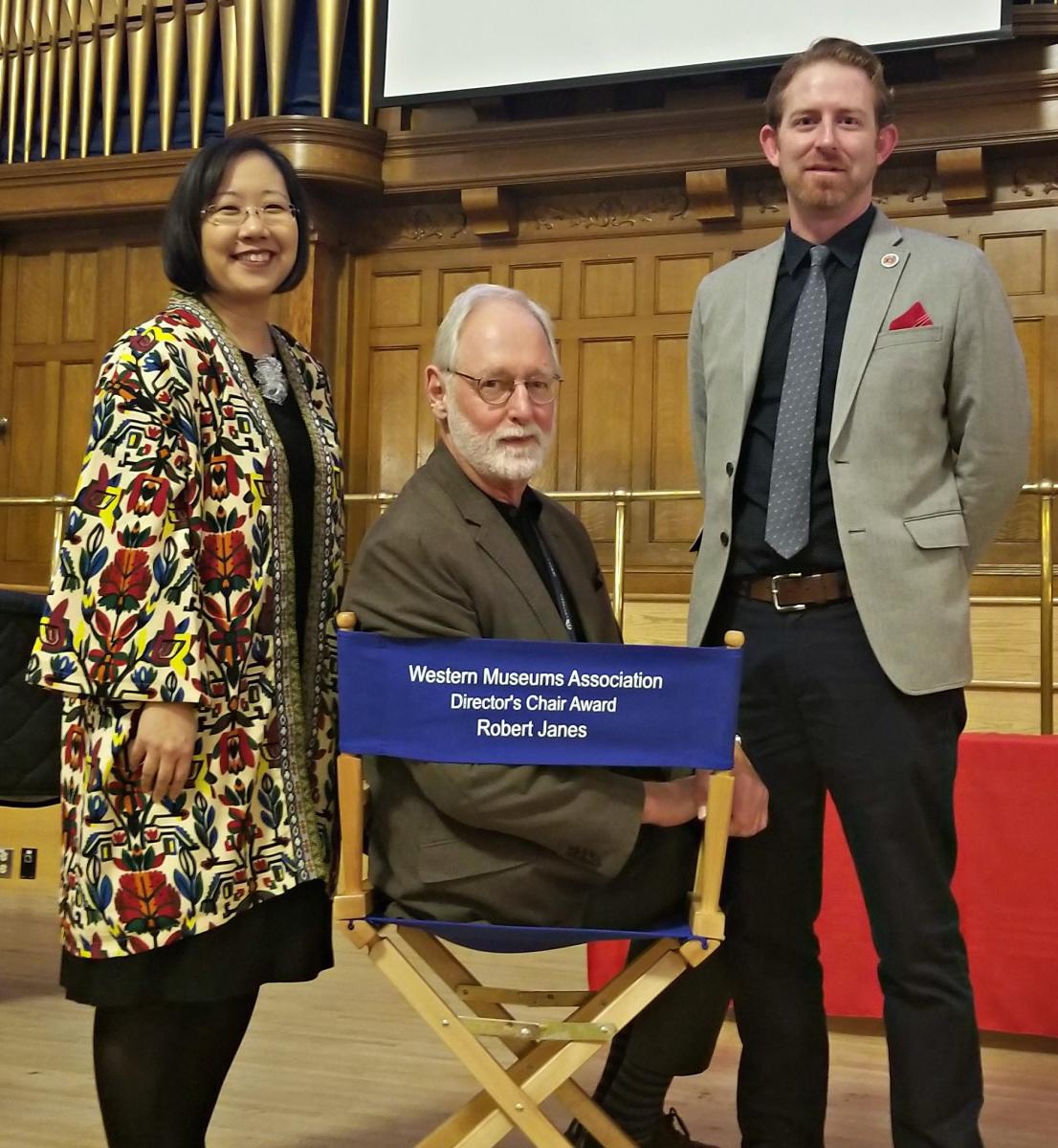The Western Museums Association presented our annual Director's Chair Award to Dr. Robert R. Janes during our Annual Meeting UNITE 2017. The Director’s Chair Award is designed to showcase and acknowledge outstanding achievements in the museum profession. The Award is presented annually to an individual who has had a significant and lasting impact on museum practices and/or the museum profession in the Western Region - and beyond!
Dr. Janes is an independent scholar-practitioner, a former museum director, Editor-in-Chief Emeritus of Museum Management and Curatorship, and a Visiting Fellow at the School of Museum Studies at the University of Leicester (UK). He has a Ph.D. in archaeology and began his career as an archaeologist in Canada’s remote Northwest Territories. Janes was given a traditional Blackfoot (First Nations) name in 1995. He has worked in and around museums for 40 years as an executive, consultant, editor, author, board member, archaeologist, instructor, volunteer, and philanthropist - devoting his career to championing museums as important social institutions that are capable of making a difference in the lives of individuals and their communities.

2017 Director's Chair recipient Dr. Robert R. Janes (sitting center), with (L-R) WMA President Lisa Sasaki
and WMA Executive Director Jason B. Jones
Dr. Robert R. Janes delivered the following remarks while accepting the 2017 Director's Chair Award:
Thank you very much for that generous introduction.
I understand that this award honours museum directors and I can’t help but recall a rumoured exchange between a mother and child. The child said, “When I grow up I want to be a museum director.” The mother replied, “But remember, child, you can’t do both.”
I’m distinctly honoured to receive this award, especially from our American colleagues and at this joint meeting of our associations. This international collaboration is innovative and rare, and I’m delighted to be part of it.
I’ve worked in and around museums for over 40 years, in a variety of capacities, including 24 years as a director. Although my director’s career ended in 2000 when I moved on to do other things in the museum world, my experience as a director provided some essential learning that continues to influence my work. I’d like to share some of this with you in these brief remarks.
Early in my career in Canada’s remote Northwest Territories, I was serving as an advisor to the Inuit Cultural Institute. An Inuk elder, Eric Anoee, told me one day, “Bob, we are not a materialistic people; we live by muscle, mind and spirit.” [1] The lesson for me – collections need not be the defining feature of a museum. They are the means to the end; not the end in themselves. I believe that we must always keep this mind, as museums workers, and always question our most comfortable and time-honoured assumptions.
Having started out in a small museum in an isolated region, I then took a job in a large urban museum. While overseeing the organizational transformation of this museum, I encountered an observation by an anonymous CEO, who said, “Anyone in charge of an organization with more than two people is running a clinic.” [2] Although at first glance this may seem unduly cynical, there is another lesson here. Museum staff are complex creatures in a complex environment, and they deserve all the respect, care and nurturing that is possible.
The origin of my next learning escapes me – I can’t recall if I coined it or read it. It is… “if I knew everything that was going on here… there isn’t enough going on.” Although this may seem like a rationalization for personal incompetence, there is yet another lesson here. Staff are at their best when they are given the freedom, authority and responsibility to do their work. Directors and staff must agree on the goals and the outcomes, and then the directors must get out of the way. There is nothing more satisfying to see than self-organized, motivated, and empowered staff doing fulfilling work.
There is a fourth learning that continues to gain meaning for me as time passes. That is – “there are senior staff who have 25 years experience, but it could well be the same year repeated 25 times.” The lesson - continuous learning provides the freedom and ingredients that allow us to be the co-creators of our lives and our museums – to adapt to change and prosper. A commitment to life-long learning is essential to our personal growth and well-being.
All of these lessons are wonderfully summed up in an observation by a politician, Karen Kaiser Clark. She wrote “Life is change; growth is optional; choose wisely.” [3] This doesn’t require any further explanation, except for one thing.
I continue to believe that museums are one of the freest and most creative work environments on the planet, and the scope for creativity and initiative should be just about limitless in a well-run museum. There are very few workplaces that offer more opportunities for thinking and acting in ways that can blend personal satisfaction and growth with organizational goals. We in the museum world are privileged, because we work in organizations whose purpose is their meaning.[4]
In closing, I want to sincerely thank the Western Museums Association, and all of you, for this award. It is your collective knowledge, experience, and inspiration that continue to point the way for me.
Thank you very much.
_______________________________________
To learn more about Dr. Robert R. Janes and his work check out his new book Museums Without Borders. We also recommend viewing the following videos: Museums and Climate Change - Are We Doing Enough?, Museums in a Troubled World, and Museums and Climate Change.
Notes
[1] Janes, RR. (1997) Museums and the Paradox of Change. Glenbow Museum and the University of Calgary Press, p.156.
[2] Quoted in A. Zaleznik,” Real Work,” Harvard Business Review, January-February 1989, p.59.
[3] Kaiser Clark, K. Available online: https://www.goodreads.com/quotes/143383-life-is-change-growth-is-optional-choose-wisely
[4] Handy, C. (1994) The Age of Paradox. Boston: Harvard Business School Press, p. 183.








Add new comment